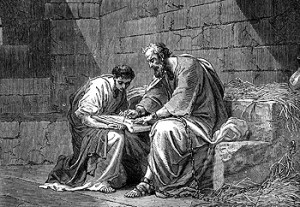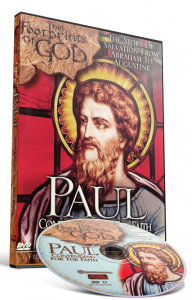I love St. Paul and love to write about him and his epistles. I also enjoyed traveling through six countries filming his life story and theology.

-
Save
St. Paul’s Letter to the Romans is often seen as impossible to understand except by theologians — and most skip right over this masterpiece.
With hopes that you will take the time to give Romans a second look, I have written a brief summary of the circumstances and a synopsis of his brilliant letter.
It is fun and easy to read and it is given to all with the hope you enjoy it — and St. Paul.

Tertius struggled to keep up, his quill scratching rapidly across the parchment. After hours of dictation and careful refinement this letter was rolled up and given into the hands of Phoebe who boarded a wooden merchant vessel heading for the hub of the Empire. The words were Greek, written from the Greek city of Corinth, dictated by a Jew of the Hebrew religion and sent to Latin Rome.

To see our DVD “Paul, Contending for the Faith“



This Post Has 2 Comments
I also love St. Paul and I believe I have come to a slightly different conclusion in my analysis. Still a thoroughly Catholic conclusion, however.
You are right that many people find St. Paul difficult to understand. St. Peter even says so (2 Pet 3:16).
The dilemma I set out to understand is this. Why do St. Paul and St. James seem to contradict, explicitly?
Romans 3:28
King James Version (KJV)
28Therefore we conclude that a man is justified by faith without the deeds of the law.
James 2:20
King James Version (KJV)
20But wilt thou know, O vain man, that faith without works is dead?
Personally, I believe they were contradicting each other. To be more precise, St. James thought he was correcting St. Paul. There was not the friendliest relationship between the two, after all. See Acts 21:18-21 for details on that matter. Also Gal 2:12.
So, it seems to me that St. James thought that St. Paul was teaching error. And so, he sought to correct the error. But it is a testament to the power of the Holy Spirit, that although these men contradicted each other, they did not teach error.
First, St. James is correct in his teaching that we are justified by faith and works. But of the two, he is the less precise. Trent VI, I’m sure you’re aware, teaches that neither faith nor works merit the grace of justification. Therefore, it is only so to speak that we are justified by faith and works.
Second, St. Paul is precisely correct when he says that no flesh is justified by the works of the Law, if only the Faith Alone proponents would read all of his teaching. Because one chapter back, Romans 2, verse 13, he says it succinctly:
Romans 2:13
King James Version (KJV)
13(For not the hearers of the law are just before God, but the doers of the law shall be justified.
Ray, we must do the works which God prepared for us. They are summarized in the Commandments. But these works do not justify us. They simply make us eligible for justification. God does not justify those who commit evil. He only justifies those who obey His Word. Doers of the Law, the Commandments, are justified by God.
Therefore, to say that we are justified by faith and works is correct, so to speak. Because without faith and good works, we will not be justified by God. But it is not our faith or our works which justify. It is God.
And finally, the Pauline teaching that we are justified by faith apart from works is a profoundly Sacramental teaching. Although it applies to all justification. Because all justification is by God. Yet in the Sacraments, God has given us a gift, wherein, we come before Him asking to be healed and He washes us clean in accordance with out faith. No works on our part. The priest pours the water and says the words and God washes us clean. That is not to say that we do nothing. For in order to present ourselves for the Sacraments, we must first study and show ourselves approved and then practice what we have learned. We must repent from all our sins and then we have them washed away, calling on the name of the Lord. But no amount of scrubbing on our part will do it. The Holy Spirit does the washing of regeneration and renewal.
Anyway, that is how I look upon the Pauline teaching of “Justification by faith apart from works of the law.”
Sincerely,
De Maria
The Paul DVD in the series is absolutely instructive and inspirational. Not many know of Paul’s story and he history behind this great Catholic leader.
Comments are closed.